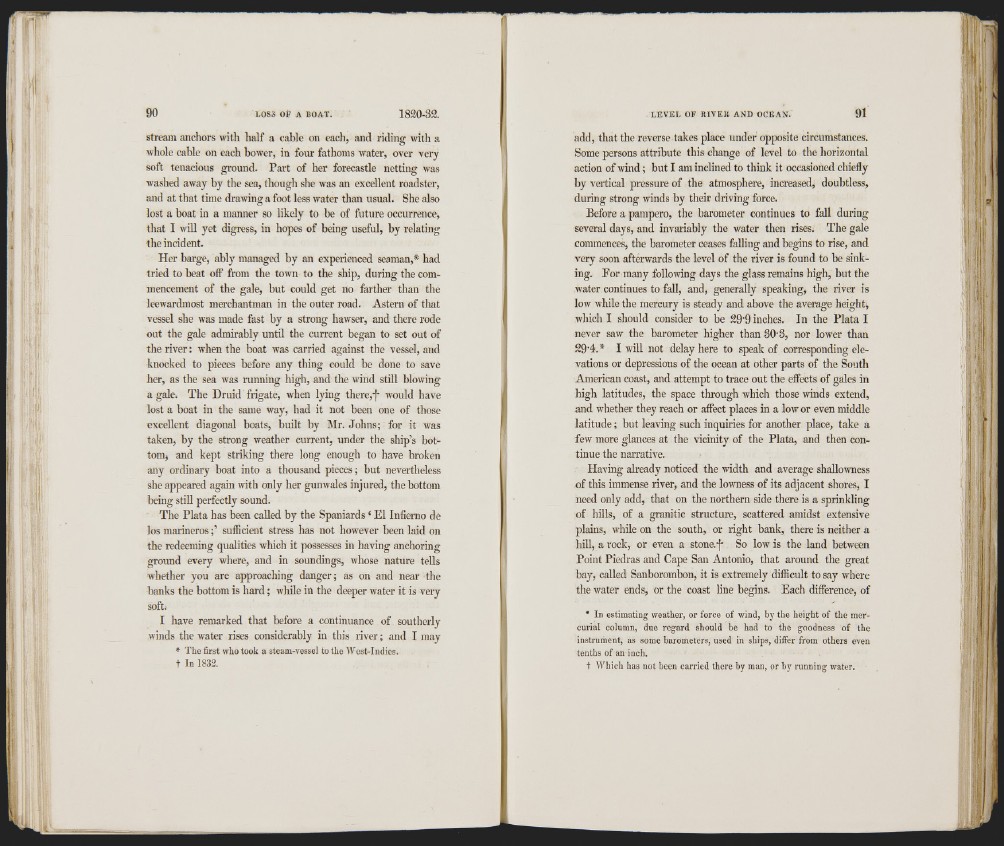
I;
90 LOSS OF A BOAT. 1820-32.
stream anchors with half a cable on each, and riding with a
whole cable on each bower, in four fathoms water, over very
soft tenacious ground. Part of her forecastle netting was
washed away by the sea, though she was an excellent roadster,
and at that time drawing a foot less water than usual. She also
lost a boat in a manner so likely to he of future occurrence,
that I will yet digress, in hopes of being useful, by relating
the incident.
Her barge, ably managed by an experienced seaman,* had
tried to beat off from the town to the ship, during the commencement
of the gale, but could get no farther than the
leewardmost merchantman in the outer road. Astern of that
vessel she was made fast by a strong hawser, and there rode
out the gale admirably until the current began to set out of
the river: when the boat was carried against the vessel, and
knocked to pieces before any thing coidd he done to save
her, as the sea was running high, and the wind still blowing
a gale. The Druid frigate, when lying there,! would have
lost a boat in the same way, had it not been one of those
excellent diagonal boats, built by Mr. Johns; for it was
taken, by the strong weather current, under the ship’s bottom,
and kept striking there long enough to have broken
any ordinary boat into a thousand pieces; but nevertheless
she appeared again ivith only her gunwales injured, the bottom
being stiU perfectly sound.
The Plata has been called by the Spaniards ‘ E l Infierno de
los marineros;’ sufficient stress has not however been laid on
the redeeming qualities which it possesses in having anchoring
ground every where, and in soundings, whose nature tells
whether you are approaching danger; as on and near the
banks the bottom is hard; while in the deeper water it is very
softi
I have remarked that before a continuance of southerly
winds the water rises considerably in this river; and I may
* The first who took a stcam-vessel to the West-Indies.
t In 1B32.
LEVEL OF R lV E li AND OCEAN. 91
add, that the reverse takes place under opposite circumstances.
Some persons attribute this change of level to the horizontal
action of wind; but I am inclined to think it occasioned chiefly
by vertical pressure of the atmosphere, increased, doubtless,
during strong winds by their driving force.
Before a pampero, the barometer continues to fall during
several days, and invariably the water then rises. The gale
commences, the barometer ceases falling and begins to rise, and
very soon afterwards the level of the river is found to be sinking.
For many following days the glass remains high, but the
water continues to fall, and, generally speaking, the river is
low while the mercury is steady and above the average height;
which I should consider to be 29‘9 inches. In the Plata I
never saw the barometer higher than 30-3, nor lower than
29'4.* I will not delay here to speak of corresponding elevations
or depressions of the ocean at other parts of the South
American coast, and attempt to trace out the effects of gales in
high latitudes, the space through which those winds extend,
and whether they reach or affect places in a low or even middle
latitude; but leaving such inquiries for another place, take a
few more glances at the vicinity of the Plata, and then continue
the narrative.
Having already noticed the width and average shallowness
of this immense river, and the lowness of its adjacent shores, I
need only add, that on the northern side there is a sprinkling
of hills, of a granitic structure, scattered amidst extensive
plains, while on the south, or right bank, there is neither a
hill, a rock, or even a stone.! So low is the land between
Point Piedras and Cape San Antonio, that around the great
bay, called Sanborombon, it is extremely difficult to say where
the water ends, or the coast line begins. Each difference, of
* In estimating weather, or force of wind, by the height of the mercurial
column, due regard should be had to the goodness of the
instrument, as some barometers, used in ships, differ from others oven
tenths of an inch.
+ Which has not been carried there by man, or by running water.